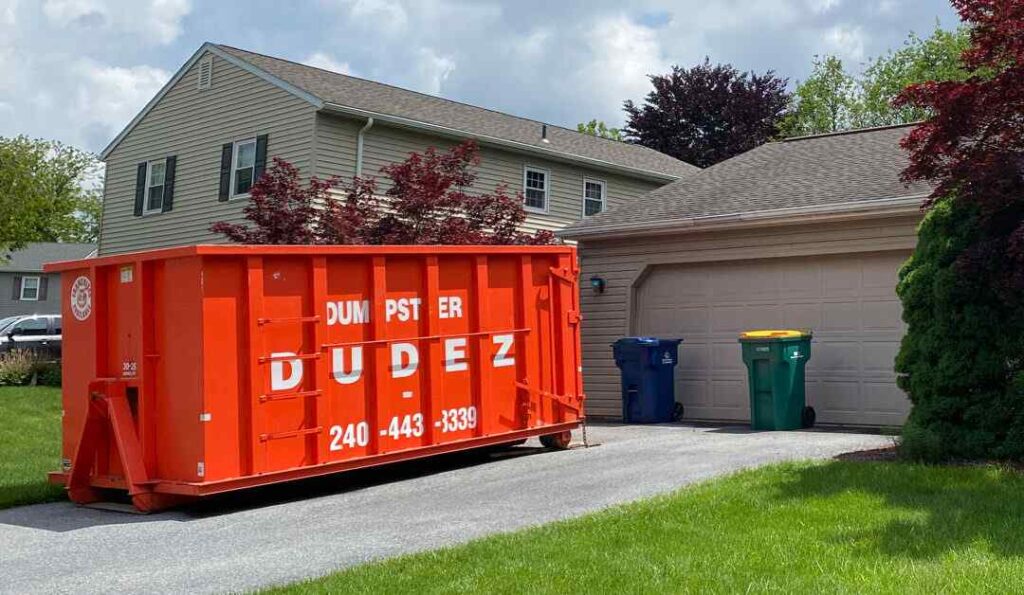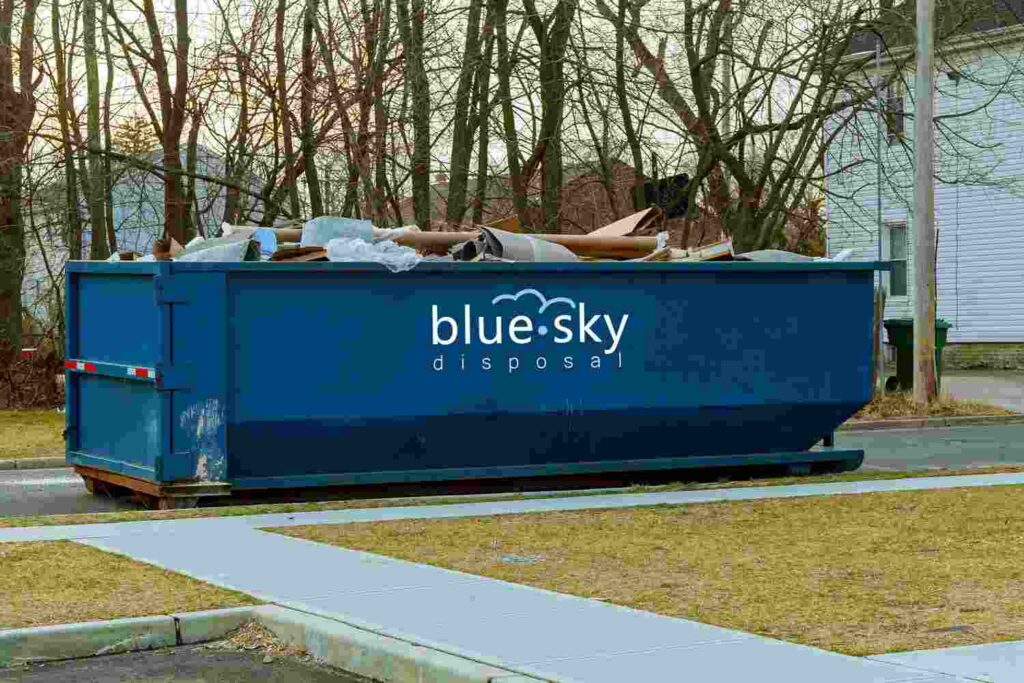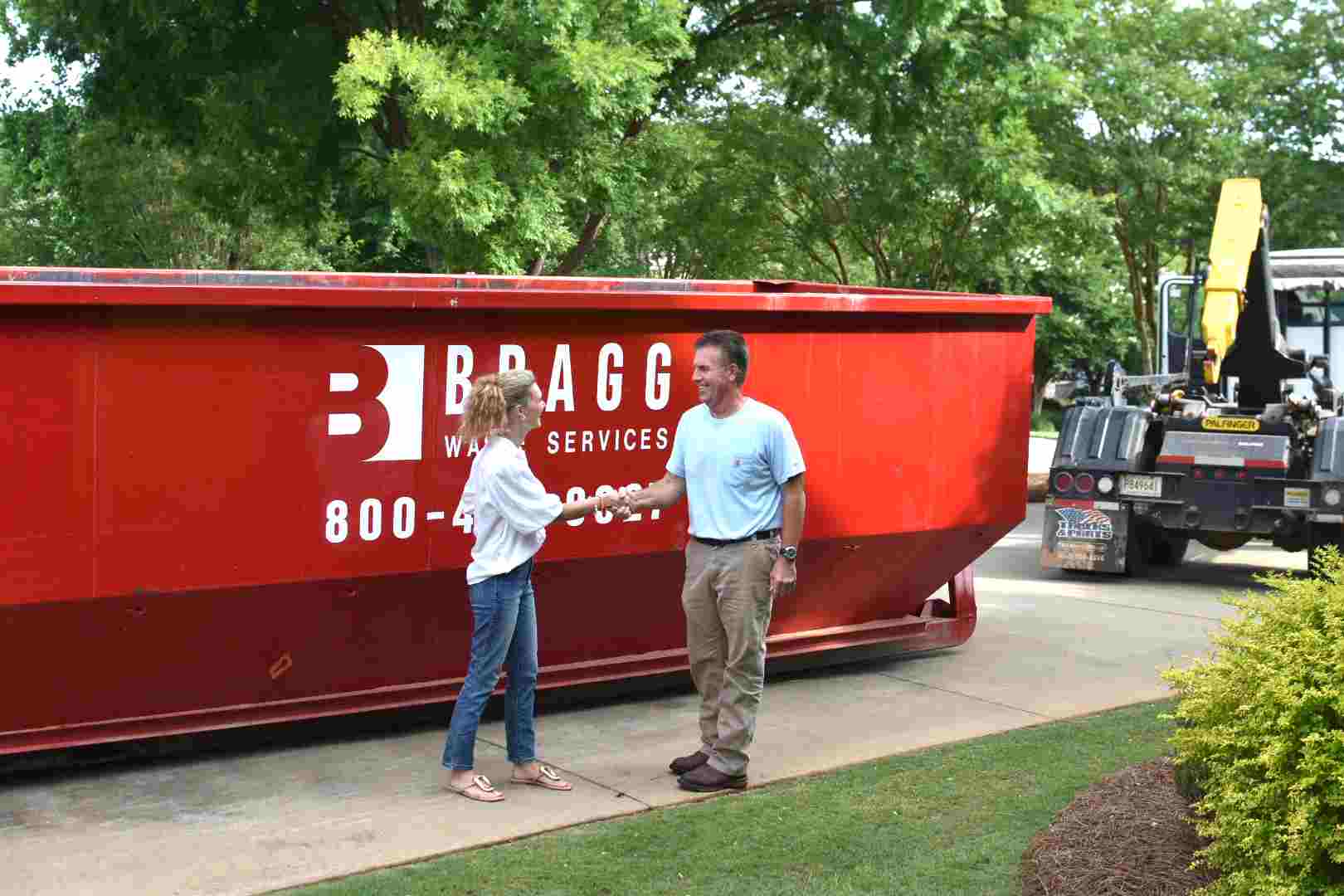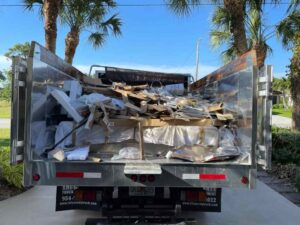Navigating the process of filling a dumpster in Michigan requires adherence to specific guidelines to ensure safety, compliance, and efficiency. Understanding the dos and don’ts is crucial to avoid potential fines, environmental harm, and logistical challenges. From permissible materials and weight restrictions to prohibited items and proper disposal methods, knowledge of these regulations is paramount. A & B Junk Removal offers comprehensive expertise in navigating these nuances, providing reliable services tailored to meet Michigan’s waste management requirements. Whether for residential or commercial needs, entrusting the filling of your dumpster to A & B Junk Removal guarantees peace of mind and seamless execution. Their experienced team not only assists in adhering to state regulations but also offers practical tips to optimize space and minimize costs. By educating clients on efficient packing techniques and environmentally responsible disposal practices, A & B Junk Removal ensures a smooth and sustainable waste management process. With a commitment to excellence and customer satisfaction, they stand as a trusted partner for individuals and businesses alike, simplifying the complexities of dumpster filling in Michigan. Whether tackling a renovation project, decluttering a property, or managing construction debris, count on A & B Junk Removal to deliver top-notch service and expert guidance every step of the way.
The Essential Guide: Filling Your Dumpster in Michigan
Embark on a journey to mastering the dos and don’ts of filling your dumpster in Michigan with A&B Junk Removal as your trusted guide.

Understanding Dumpster Regulations in Michigan: A Primer
Before embarking on any project that involves renting a dumpster services in Michigan, it’s crucial to familiarize yourself with the relevant regulations and guidelines. These regulations can vary based on the city or municipality, so it’s essential to research the specific rules in your area. Michigan state laws often dictate what materials can be disposed of in dumpsters, how they should be sorted, and any size or weight restrictions. Understanding these regulations not only helps you avoid potential fines but also ensures that you’re contributing to a safer and cleaner environment. Moreover, being aware of dumpster regulations helps you make informed decisions about the size and type of dumpster you need for your project. Some areas may have restrictions on the placement of dumpsters or require permits for their use. By understanding these regulations upfront, you can streamline the process of obtaining permits and avoid delays or complications during your project. Overall, a comprehensive understanding of dumpster regulations in Michigan is essential for ensuring legal compliance and smooth project execution.
Dos and Don’ts of Properly Loading Your Dumpster in Michigan
Properly loading your dumpster is not just about fitting in as much as possible; it’s also about safety, efficiency, and environmental responsibility. One essential “do” is to distribute weight evenly throughout the dumpster to prevent it from tipping over during transport. This means placing heavier items on the bottom and lighter ones on top. Additionally, breaking down large items like furniture or appliances can maximize space and ensure efficient use of the dumpster’s capacity. Moreover, segregating recyclable materials from general waste is a crucial “do” to promote sustainable waste management practices in Michigan. On the flip side, some “don’ts” include overfilling the dumpster beyond its capacity, as this can lead to safety hazards and additional fees. It’s also important not to dispose of prohibited items such as hazardous materials, chemicals, or electronics, as these can contaminate the environment and pose risks to public health. Furthermore, avoiding placing the dumpster in areas that obstruct traffic or pose a danger to pedestrians is another important “don’t” to ensure community safety and compliance with local regulations. Overall, adhering to these dos and don’ts promotes responsible dumpster usage and contributes to a cleaner and safer environment in Michigan.
Essential Guidelines for Filling Your Dumpster in Michigan Safely
Safety should always be a top priority when filling a dumpster in Michigan or anywhere else. One crucial guideline is to wear appropriate personal protective equipment (PPE) such as gloves and safety glasses to prevent injuries while handling waste materials. Additionally, be mindful of any sharp objects or hazardous materials that could cause harm during the loading process. It’s also important to avoid climbing into the dumpster, as this poses a significant risk of accidents or injuries. Instead, use ramps or other equipment to safely load materials from ground level. Another essential safety consideration is to be mindful of weight limits and load distribution to prevent the dumpster from becoming unstable during loading or transport. Overloading a dumpster can cause it to tip over, leading to property damage, injuries, and potential legal liabilities. Furthermore, always follow proper lifting techniques to avoid strains or injuries while loading heavy items into the dumpster. By adhering to these essential guidelines, you can ensure a safe working environment for yourself and others involved in the waste disposal process in Michigan.
Maximizing Efficiency: Dos for Optimizing Your Dumpster Space in Michigan
Efficiently utilizing the space in your dumpster not only maximizes its capacity but also minimizes the need for additional pickups, which can save time and money. One important “do” for maximizing efficiency is to compact waste materials whenever possible, either by breaking down bulky items or using a compactor if available. This helps to create more room in the dumpster for additional waste and ensures that you’re getting the most value out of your rental. Additionally, consider organizing and stacking items strategically to make the best use of available space. Another key consideration for efficiency is to plan ahead and prioritize waste disposal based on the dumpster’s capacity and schedule. By scheduling pickups or exchanges at regular intervals, you can avoid the risk of overfilling the dumpster or running out of space before your project is complete. Moreover, communicate with your dumpster rental provider to discuss any specific requirements or limitations regarding pickup schedules and capacity. By following these dos for optimizing dumpster space in Michigan, you can streamline your waste disposal process and ensure a more cost-effective and efficient project outcome.
Avoiding Fines and Penalties: Don’ts When Filling Your Dumpster in Michigan
Understanding what not to do when filling your dumpster in Michigan is just as crucial as knowing what to do. One major “don’t” is disposing of prohibited materials or hazardous waste in the dumpster. Michigan regulations often have strict guidelines regarding what can and cannot be placed in dumpsters, including items like chemicals, batteries, tires, and electronics. Failure to comply with these regulations can result in fines, penalties, or even legal consequences. It’s essential to research and adhere to the specific guidelines in your area to avoid costly violations. Additionally, it’s important not to exceed the weight or size limits specified by your dumpster rental agreement or local regulations. Overloading a dumpster can not only lead to safety hazards but also incur additional fees for exceeding weight capacities. Similarly, avoid overfilling the dumpster beyond its capacity, as this can make it unsafe for transport and may result in refusal of service or additional charges from the rental company. By avoiding these common pitfalls and adhering to dumpster regulations in Michigan, you can prevent fines and penalties while ensuring a smooth and compliant waste disposal process.
Environmental Considerations: Responsible Practices for Dumpsters in Michigan
Environmental stewardship is increasingly important in waste management practices, and Michigan is no exception. One essential consideration is to minimize waste by practicing source reduction and recycling whenever possible. This involves sorting materials before disposal to separate recyclables from general waste and diverting them to recycling facilities. By reducing the amount of waste sent to landfills, you can conserve natural resources, reduce greenhouse gas emissions, and minimize environmental impact. Another important aspect of environmental responsibility is proper disposal of hazardous materials and chemicals. These substances can pose serious risks to the environment and public health if not handled and disposed of correctly. Michigan regulations typically prohibit the disposal of hazardous waste in dumpsters and require special handling and disposal procedures. It’s essential to follow these guidelines and, if necessary, seek out designated disposal facilities or hazardous waste collection events to ensure proper handling and disposal of these materials. By incorporating these responsible practices into your dumpster usage in Michigan, you can contribute to environmental conservation and sustainability efforts in the state.
Dos and Don’ts of Hazardous Waste Disposal in Michigan Dumpsters
Hazardous waste disposal requires special attention and care to prevent environmental contamination and public health risks. In Michigan, it’s essential to adhere to the dos and don’ts of hazardous waste disposal to ensure compliance with regulations and protect the environment. One crucial “do” is to properly identify and segregate hazardous materials from general waste to prevent accidental exposure or contamination. This involves understanding the characteristics of hazardous waste and following guidelines for its safe handling, storage, and disposal. On the other hand, some important “don’ts” include never disposing of hazardous waste in regular dumpsters or mixing it with non-hazardous materials. Doing so can pose significant risks to sanitation workers, the environment, and public health. Instead, utilize designated hazardous waste collection facilities or events to properly dispose of these materials. Additionally, avoid pouring hazardous liquids or chemicals directly into dumpsters, as this can lead to leaks, spills, and contamination of soil and water sources. By following these dos and don’ts of hazardous waste disposal in Michigan, you can ensure safe and compliant handling of potentially harmful materials.
Community Etiquette: Proper Behavior When Filling Your Dumpster in Michigan
When using a dumpster in Michigan, it’s essential to be considerate of your neighbors and the community at large. Proper dumpster etiquette involves respecting property boundaries, keeping the area around the dumpster clean and tidy, and minimizing disruptions to nearby residents. One important aspect of community etiquette is to avoid placing dumpsters in areas that obstruct traffic flow or impede access to driveways, sidewalks, or public rights-of-way. This helps maintain safety and convenience for pedestrians, motorists, and residents in the vicinity. Additionally, be mindful of noise levels and operating hours when filling your dumpster, especially in residential areas. Avoid loud or disruptive activities during early morning or late evening hours to minimize disturbances to neighbors. It’s also courteous to inform nearby residents or property owners in advance if you anticipate any significant noise or activity related to your dumpster use. By practicing good community etiquette, you can foster positive relationships with your neighbors and contribute to a harmonious living environment in Michigan.
Sorting Your Waste: Dos for Effective Recycling and Waste Management in Michigan Dumpsters
Effective waste management in Michigan involves sorting materials to maximize recycling and minimize landfill waste. One crucial “do” is to separate recyclable materials such as paper, cardboard, plastics, glass, and metal from general waste. Many communities in Michigan have recycling programs or designated drop-off locations where these materials can be recycled. By sorting recyclables and disposing of them properly, you help conserve natural resources, reduce energy consumption, and minimize the environmental impact of waste disposal. Another important consideration is to properly dispose of organic waste, such as food scraps and yard debris, through composting or designated organic waste collection programs. Composting organic materials not only reduces the amount of waste sent to landfills but also produces nutrient-rich compost that can be used to enrich soil and support plant growth. By incorporating these dos for effective recycling and waste management into your dumpster usage in Michigan, you can contribute to sustainability efforts and help protect the environment for future generations. Understanding the advantages of same-day dumpster rental services is essential for optimizing waste disposal efficiency, which aligns with adhering to the dos and don’ts of filling your dumpster in Michigan to ensure responsible waste management practices.

Legal Compliance: Ensuring You Follow Michigan’s Regulations When Using a Dumpster
Compliance with Michigan’s dumpster regulations is essential to avoid fines, penalties, and legal liabilities. One important aspect of legal compliance is obtaining any necessary permits or approvals before placing a dumpster on public property or right-of-way. Depending on local regulations, permits may be required for temporary placement of dumpsters on streets, sidewalks, or other public areas. Additionally, be aware of any size, weight, or placement restrictions imposed by local ordinances to ensure compliance with legal requirements. Furthermore, it’s essential to follow all applicable state and federal regulations regarding waste disposal, including proper handling and disposal of hazardous materials. Failure to comply with these regulations can result in fines, environmental damage, and legal consequences. By staying informed about Michigan’s dumpster regulations and adhering to legal requirements, you can avoid potential liabilities and ensure a smooth and compliant waste disposal process.
FAQs
What materials can I dispose of in my Michigan dumpster?
Accepted materials typically include household debris, construction waste, furniture, and yard waste. However, hazardous materials such as chemicals, electronics, batteries, and tires are usually prohibited. Always check local regulations and guidelines to ensure compliance.
How should I properly load my dumpster to avoid penalties?
Distribute weight evenly, place heavier items on the bottom, and avoid overfilling or exceeding weight limits. Sort recyclables separately and follow guidelines for hazardous waste disposal to prevent fines.
Are there size or weight restrictions for dumpsters in Michigan?
Yes, Michigan often imposes size and weight limits for dumpsters. Exceeding these limits may result in additional fees or penalties. It’s crucial to rent an appropriately sized dumpster for your project and avoid overloading it.
Can I place my dumpster anywhere on my property?
Placement regulations vary by locality. In some areas, you may need a permit for placing a dumpster on public property or a right-of-way. Ensure compliance with local ordinances and obtain any necessary permits before placement.
What should I do with hazardous materials or items not accepted in dumpsters?
Dispose of hazardous materials at designated collection sites or events. Contact local authorities for guidance on proper disposal procedures. Never dispose of hazardous waste in dumpsters to avoid environmental contamination and legal consequences.
Conclusion
In conclusion, understanding the dos and don’ts of filling your dumpster in Michigan is essential for a safe, efficient, and compliant waste disposal process. By adhering to regulations, such as properly sorting materials, avoiding overloading, and disposing of hazardous items responsibly, you not only prevent fines and penalties but also contribute to environmental conservation efforts. Prioritizing safety, proper loading techniques, and community etiquette ensures a harmonious living environment and fosters positive relationships with neighbors. Ultimately, by following these guidelines, you can make the most of your dumpster rental while minimizing environmental impact and promoting sustainable waste management practices in Michigan. Clear communication with your dumpster rental provider is crucial to ensure a smooth and hassle-free experience. Before renting a dumpster in Michigan, make sure to discuss any specific requirements or concerns you may have with the rental company. This includes understanding the terms of the rental agreement, including pricing, pickup schedules, and any additional fees or charges. Additionally, communicate any special considerations such as access restrictions or placement preferences to ensure that the rental process meets your needs. By maintaining open lines of communication with your rental provider, you can address any issues promptly and ensure a positive dumpster rental experience in Michigan.




